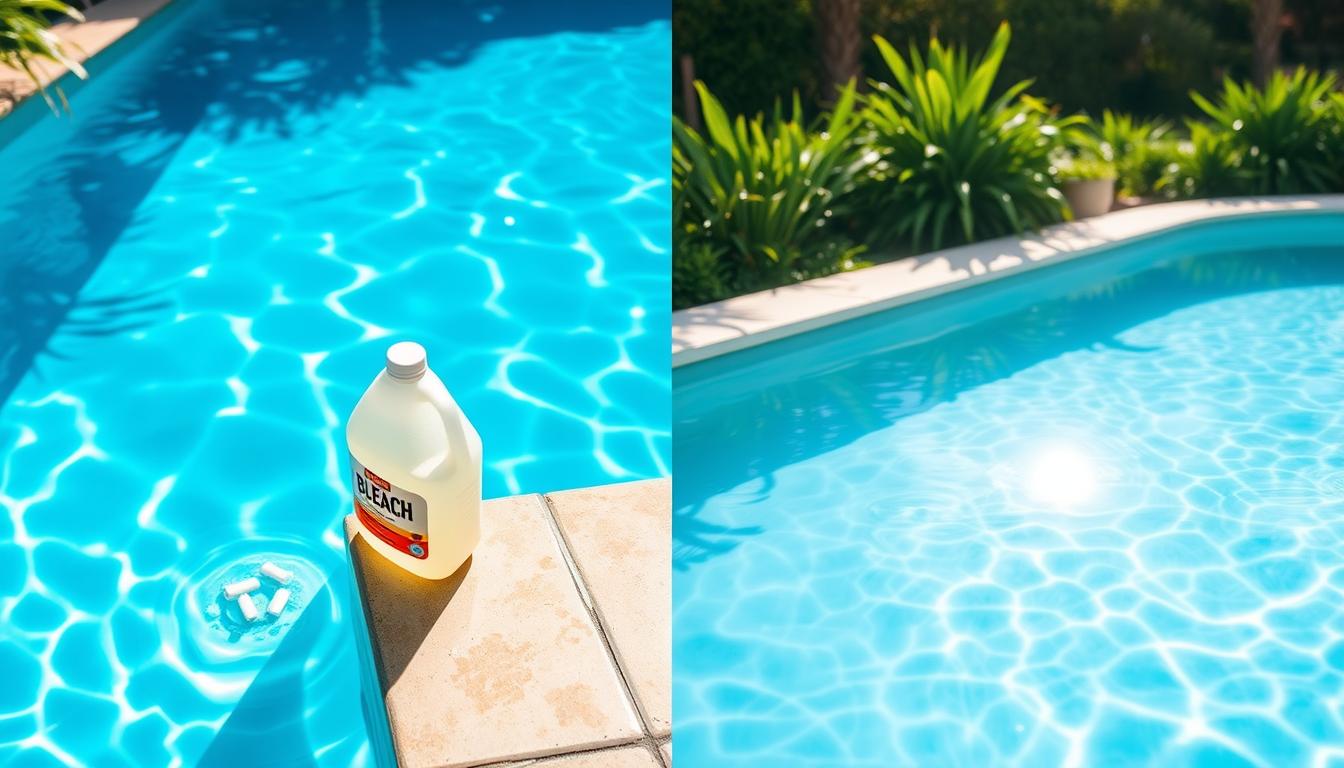
Pool owners always seek effective and affordable ways to maintain clean, safe swimming pools. Chlorine is the most common pool sanitization method. However, some wonder if pool chlorine alternatives can be equally effective.
One option often discussed for safe pool chemicals is household bleach in pools. This alternative has gained attention among pool owners seeking different sanitization methods.
Using bleach instead of chlorine in pools isn’t as strange as it might sound. Both substances contain sodium hypochlorite. When mixed with water, it turns into hypochlorous acid (HOCL), which sanitizes pools.
However, don’t start pouring bleach into your pool just yet. It’s crucial to understand the differences between bleach vs chlorine. You should also know the potential risks and benefits of this alternative method.
Understanding the Differences Between Bleach and Chlorine
Pool owners often consider bleach as a chlorine substitute for DIY pool maintenance. However, knowing the differences between bleach and chlorine is crucial. This knowledge ensures effective use of safe pool chemicals.
Composition and Concentration
Bleach and chlorine both contain sodium hypochlorite as their active ingredient. However, the concentration varies significantly between the two. Pool shock and chlorine tablets have a much higher sodium hypochlorite concentration than liquid bleach.
This concentration difference affects their ability to disinfect pool water. Higher concentrations in pool-specific products make them more effective for water treatment.
Let’s compare typical sodium hypochlorite concentrations in various pool chemicals:
| Product | Sodium Hypochlorite Concentration |
|---|---|
| Household Bleach | 5-6% |
| Liquid Chlorine | 10-12% |
| Chlorine Tablets | 90% |
| Pool Shock | 65-75% |
Chlorine tablets and pool shock have much higher sodium hypochlorite concentrations. This makes them more effective at disinfecting pool water than household bleach.
Stability and Effectiveness
Bleach and chlorine differ in their stability when exposed to sunlight. Chlorine tablets and granules often contain stabilizers like cyanuric acid. These stabilizers protect the active ingredient from breaking down under direct sunlight.
Bleach lacks these stabilizers and degrades quickly when exposed to UV rays. This rapid breakdown means more frequent application to maintain proper disinfection levels.
Rafi Friedman, owner of a pool maintenance company, states, “We always recommend using chlorine tablets or shock for our clients’ pools. Bleach simply doesn’t provide the same level of stability and effectiveness as professional-grade chlorine products.”
Frequent bleach application can disrupt the pool’s chemical balance. This may lead to issues like algae growth or cloudy water. It’s also time-consuming for pool owners.
Bleach may seem like an attractive alternative for DIY pool maintenance. However, it’s important to recognize its limitations compared to chlorine products. Understanding these differences helps pool owners choose the best safe pool chemicals for effective swimming pool disinfection.
Pros and Cons of Using Bleach in Your Pool
Pool owners often consider bleach for DIY pool maintenance. It’s readily available and easy to use. However, it’s crucial to weigh the pros and cons before choosing bleach over chlorine.
Cost-Effectiveness
Bleach might seem cheaper than chlorine tabs at first glance. But its lower concentration of active chlorine requires larger quantities. This can make bleach less cost-effective in the long run.
Accessibility and Ease of Use
Bleach’s widespread availability is a big plus for quick pool sanitization. It’s easy to find and simple to add to your pool. However, using the right amount is crucial to avoid skin irritation.
Too much bleach can raise the pool’s pH levels. You’ll need to rebalance the water with safe pool chemicals afterward.
Potential Risks and Drawbacks
Bleach can effectively disinfect pools, but it comes with risks. Overuse can irritate swimmers’ skin, eyes, and respiratory system. Its high toxic content can be harmful if not used properly.
Bleach may also cause limescale deposits, leading to cloudy water. This can potentially damage pool equipment. Consider these drawbacks carefully before choosing bleach for your pool.







